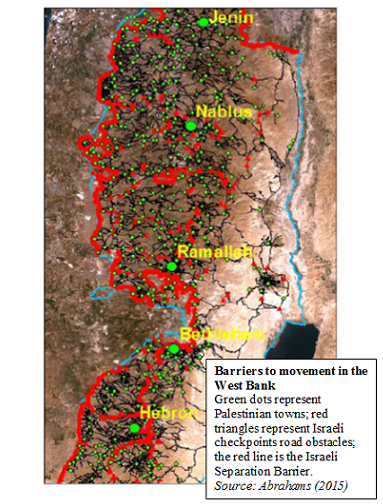Transport frictions are generally considered a significant barrier to growth, as they impose a high cost on the trade of goods. In fragile and conflict affected states, these frictions can be particularly burdensome, as in the Occupied Palestinian Territories (OPT), where a system of militarized checkpoints and roadblocks impose heavy limits on the mobility of goods and people. Yet, interestingly, the IT sector in the OPT has witnessed a significant expansion since 2010, in contrast to most other sectors. One explanation is that as mobility barriers decrease the incentives to invest in the production of physical goods, the opportunity cost of investing in IT also falls – and the relative incentive to invest it IT rises. In fact, focusing on software development and website design, the IT sector is able to employ the high skilled labour force in the area while overcoming mobility restrictions by exploiting possibilities for employees to work remotely, for instance.
In this context, this project seeks to evaluate the impact of mobility barriers on private sector development, and the IT sector in particular, in the OPT. In order to test their predictions, the researchers will use secure firm level data from the Palestinian Bureau Census Statistics, which they will combine with an index of mobility barriers that will be constructed using a digitalization the road network and of the obstacles on the ground. Their identification strategy relies on the fact that the variation in road blocks and settlements is driven by military and security concerns rather than economic conditions. In addition, the researchers will conduct a firm survey to identify the specific channels through which barriers affect private sector development and IT, and will test for the presence of knowledge spillovers between firms in Israel, a software hub, and on the West Bank.
Exploring the constraints to the development of IT sector can have important policy implications for other countries seeking to support fast-growing IT sector, especially conflict-affected countries where the transportation of goods is often difficult. As the goods production and industrialized agriculture becomes more costly, there could be scope for policies to incentivize the IT sector.






